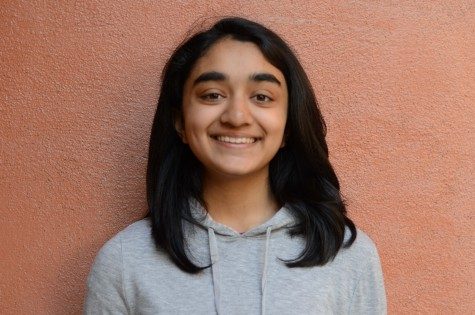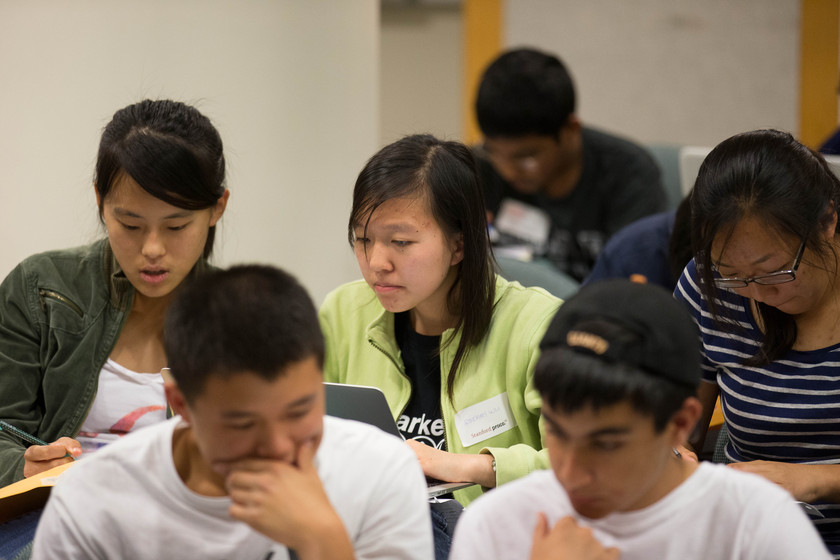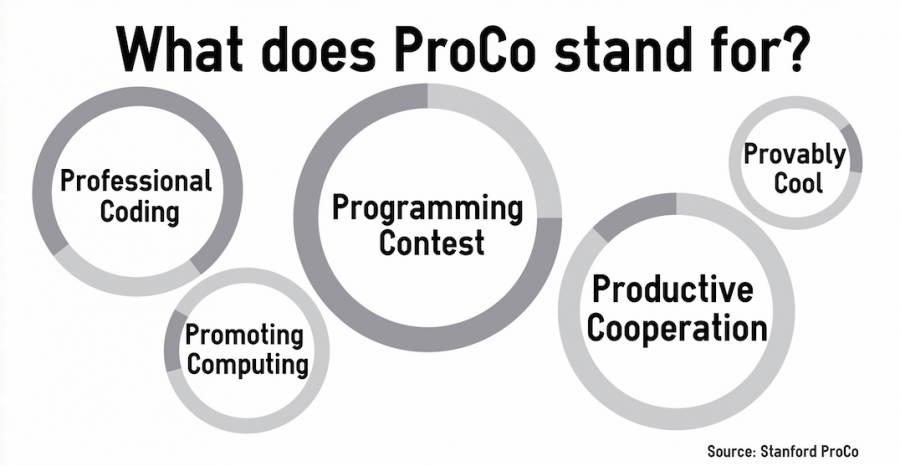Upper school programmers head to Stanford ProCo
Upper school students will participate in Stanford ProCo 2015, a programming contest for Bay Area high school students, which will take place at Stanford University this Sunday.
The competition is open to programmers of all levels of experience, with a novice division for those with less than one year of experience and an advanced division for everyone else.
The contest consists of two sections: a two-hour long speed round with eight problems and a special round that changes each year and will remain a surprise until the day of the contest.
Last year, the special round included identifying problems with bugged code.
Freshmen Jerry Chen and Randy Zhao competed in ProCo as eighth-graders and received first place in Speed Round portion of the novice division.
“It’s challenging, but once you think about it for a long time, you actually solve a problem,” Jerry, who is participating in ProCo again this year, said. “It’s really satisfying.”
Harker Algorithm club, which is currently wrapping up its inaugural year, tries to prepare students for programming contests just like Stanford ProCo.
Founded by David Lin (12), the current President of the club, and Lawrence Li (11), the club aims to teach students about algorithms and their real-world applications.
An algorithm is a step-by-step procedure or methodology used to solve a problem.
“There are a lot of skills we found [that] at the end of the day, required programming in some way,” David said. “For instance in research, a lot of the machine learning algorithms are based on this same set of algorithms.”
David has previously participated in ProCo with Ashwath Thirumalai (12) and Andrew Jin (12).
“It was definitely a lot of fun, because it was just solving problems without the documentation,” David said. “It’s reducing it to problem-solving and finding creative ways to solve a problem within the time frame of one second using a program. It was a great experience.”
Teams for ProCo, which can have up to three students each, can submit code as many times as they wish until their submission passes all test cases. The number of incorrect submissions before one that passes does not affect a team’s ranking.
Rankings for the speed round are determined by the number of correct submissions and the time when the code was submitted.
C, C++, Java and Python 2.7 are all accepted.
Teams that rank in the top three of their division receive prizes. In past years, winners have earned iPad minis or Nintendo DS handheld devices.
Internet access is permitted only for accessing select documentation websites, and only one laptop is allowed per team.
Sponsors of the competition include Stanford University, Google, Facebook, Apple and Dropbox.
Registration for ProCo closed on May 1. The event will begin at 8 a.m. in the Gates Computer Science Building at Stanford.
An online version of the contest will be available afterwards, although rankings and prizes will not be awarded to online participants.

Sahana Srinivasan (12) is the Editor-in-Chief of the Winged Post and Wingspan, having previously served as Managing Editor, Asst. STEM Editor and a reporter....
Maya Kumar (11) is the Features Editor for the Winged Post. This is her third year in Journalism and her favorite part is collaborating with fellow journalism...


















![“[Building nerf blasters] became this outlet of creativity for me that hasn't been matched by anything else. The process [of] making a build complete to your desire is such a painstakingly difficult process, but I've had to learn from [the skills needed from] soldering to proper painting. There's so many different options for everything, if you think about it, it exists. The best part is [that] if it doesn't exist, you can build it yourself," Ishaan Parate said.](https://harkeraquila.com/wp-content/uploads/2022/08/DSC_8149-900x604.jpg)




![“When I came into high school, I was ready to be a follower. But DECA was a game changer for me. It helped me overcome my fear of public speaking, and it's played such a major role in who I've become today. To be able to successfully lead a chapter of 150 students, an officer team and be one of the upperclassmen I once really admired is something I'm [really] proud of,” Anvitha Tummala ('21) said.](https://harkeraquila.com/wp-content/uploads/2021/07/Screen-Shot-2021-07-25-at-9.50.05-AM-900x594.png)







![“I think getting up in the morning and having a sense of purpose [is exciting]. I think without a certain amount of drive, life is kind of obsolete and mundane, and I think having that every single day is what makes each day unique and kind of makes life exciting,” Neymika Jain (12) said.](https://harkeraquila.com/wp-content/uploads/2017/06/Screen-Shot-2017-06-03-at-4.54.16-PM.png)








![“My slogan is ‘slow feet, don’t eat, and I’m hungry.’ You need to run fast to get where you are–you aren't going to get those championships if you aren't fast,” Angel Cervantes (12) said. “I want to do well in school on my tests and in track and win championships for my team. I live by that, [and] I can do that anywhere: in the classroom or on the field.”](https://harkeraquila.com/wp-content/uploads/2018/06/DSC5146-900x601.jpg)
![“[Volleyball has] taught me how to fall correctly, and another thing it taught is that you don’t have to be the best at something to be good at it. If you just hit the ball in a smart way, then it still scores points and you’re good at it. You could be a background player and still make a much bigger impact on the team than you would think,” Anya Gert (’20) said.](https://harkeraquila.com/wp-content/uploads/2020/06/AnnaGert_JinTuan_HoHPhotoEdited-600x900.jpeg)

![“I'm not nearly there yet, but [my confidence has] definitely been getting better since I was pretty shy and timid coming into Harker my freshman year. I know that there's a lot of people that are really confident in what they do, and I really admire them. Everyone's so driven and that has really pushed me to kind of try to find my own place in high school and be more confident,” Alyssa Huang (’20) said.](https://harkeraquila.com/wp-content/uploads/2020/06/AlyssaHuang_EmilyChen_HoHPhoto-900x749.jpeg)




